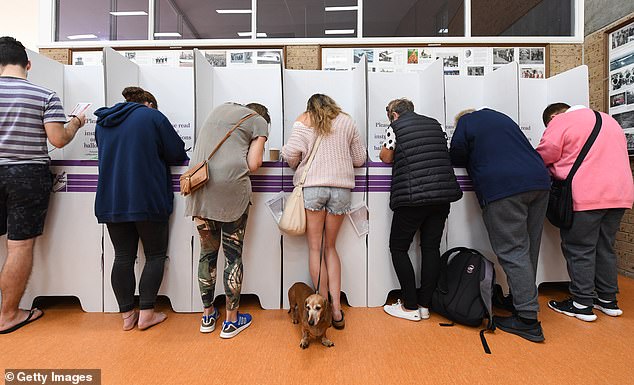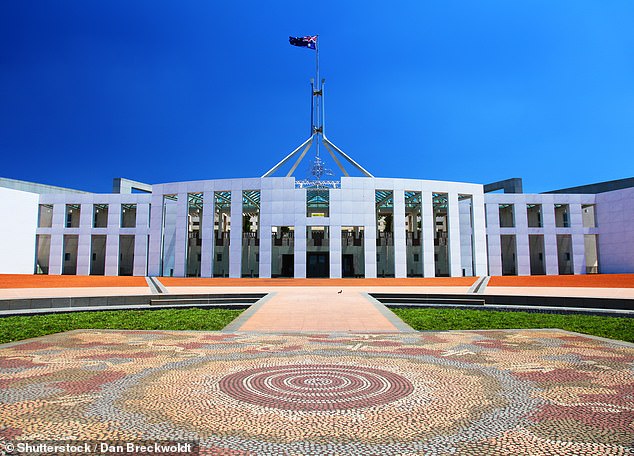Indigenous voice for parliament: why votes in the ACT and Northern Territory will mean less than ballots from Australian states
The votes of more than 700,000 Australians – including 86,000 Indigenous people – will be worth less than those of other Australians in next month’s Voice referendum.
The proposal to amend the constitution to include an Indigenous advisory body to the Australian parliament would only happen if two majorities are reached in the October 14 election.
That’s a majority of all voters and a majority of states in favor of the proposal. Collectively this is known as ‘a double majority’.
But it gives extra weight to votes cast by people whose residential addresses are in New South Wales, Victoria, Queensland, Western Australia, South Australia and Tasmania.
That means the ballots of residents of Australia’s ‘non-states’ – the ACT and Northern Territory – with a total combined population of 714,654, will only count towards the overall national majority, but not towards the second.
While it is a technical issue, its impact is particularly real for the people likely to be most affected by the October 14 poll result, Australia’s Aboriginal and Torres Strait Islander people.
The referendum rules give extra weight to votes cast by people whose residential addresses are in the Australian states, but not in the ACT or Northern Territory. Pictured Anthony Albanese with Yothu Yindi board member Djaawa Yunupingu in East Arnhem Land in 2022

The votes of more than 700,000 Australians – including 86,000 Indigenous people – will be worth less than those of other Australians in next month’s Voice referendum
It means that the votes of 86,012 Aboriginal and Torres Strait Islander people living in both territories (76,487 of which are from the NT) mean less than those of other Australians.
Nearly 31 percent of the NT population is Indigenous.
University of NSW law professor Paul Kildea said many people find this current situation ‘unfair and difficult to justify’ in a column in The conversation.
“State and territory votes are not treated equally (so) territory voters do not have a major influence on the outcome of the referendum,” wrote Mr Kildea, associate professor at UNSW’s Faculty of Law and Justice.
“To many, this seems unfair and difficult to justify… should we change the rules so that voters in their territory are treated like everyone else?”
He did acknowledge that a referendum would have to be very close before votes in the territory would make a difference.
Mr Kildea pointed out that throughout Australia’s history, the territories have not had a decisive vote in the country’s 44 referenda.
The last, in 1999, asked voters whether Australia should become a republic.
The republic referendum was defeated due to divisions among Republicans over the proposed method for selecting the president.
The reason territory votes count less is because when the Constitution was created at federation in 1901, the NT was part of South Australia and the ACT was within NSW.
Mr Kildea said one argument for maintaining the status quo and not giving more power to the voices of the territories is that territories are different from states.
States are sovereign bodies with full powers of self-government areas are under Commonwealth control.
He also said that a change in the amendment procedure would give voters too much influence over constitutional reforms.
He said the argument for change is that the current model gives the votes of 572,000 Tasmanians more power than those of 714,000 Territorians.
The lead-up to the proposed Voice to Parliament has degenerated into divisive debates in recent weeks, amid bitter disagreements over racism and whether indigenous people would be better or worse off.
On Monday, veteran rocker Gary “Angry” Anderson gave an impassioned explanation for why he was ranked No.
The Rose Tattoo frontman said after listening to Senator Jacinta Nampijinpa Price and others that he does not believe the referendum’s success will help address “the real issues” facing Aboriginal people.

The ballots of residents of the ACT and Northern Territory – total combined population 714,654 – only count towards the first majority required, the total national count, but not towards the second, a majority of states

University of NSW law professor Paul Kildea (pictured) said many people found the current situation where referendum votes from states outweigh those from territories “unfair and difficult to justify”.
He also criticized that anyone who opposes the establishment of an advisory body to inform the government is merely ‘racist’.
Meanwhile, Shadow Indigenous Affairs Minister Jacinta Price broke down in tears in an emotional speech as she described the referendum as the ‘biggest gaslighting event our nation has ever seen’.
The architects of the Uluru Statement from the Heart, which underpinned the Voice, are holding a series of public discussions to help voters in the run-up to the referendum.
Alyawarre woman Pat Anderson and Cobble Cobble woman Megan Davis will visit Australian cities to talk about the history of the Uluru Statement and the origins of the Voice proposal, starting this week in Melbourne.
